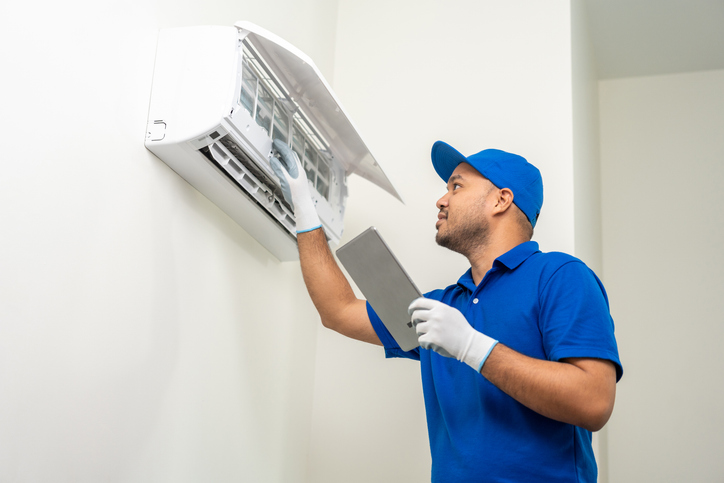Introduction
An air conditioning system plays a crucial role in maintaining indoor comfort, especially during extreme weather conditions. Over time, AC units become less efficient, leading to higher energy bills, frequent breakdowns, and inconsistent cooling. When your system reaches this stage, investing in an AC replacement service becomes necessary. From choosing the right unit size to understanding warranty coverage, every decision impacts your investment. This guide explores the critical aspects you need to evaluate before proceeding with an AC replacement.
1. Assessing Your AC’s Age and Performance
An AC unit’s lifespan typically ranges between 10 and 15 years. If your system is older and struggling to maintain indoor temperatures, it may be time to replace it. Frequent repairs, unusual noises, and poor airflow indicate that the system is nearing the end of its service life. Older AC units also lack the energy efficiency of modern models, which results in higher electricity bills. By upgrading to a newer unit, homeowners can benefit from improved cooling, reduced maintenance costs, and better overall efficiency.
2. Evaluating Energy Efficiency Ratings
Energy efficiency is one of the most important factors when selecting an AC replacement. Units with higher Seasonal Energy Efficiency Ratio (SEER) ratings consume less power while delivering optimal cooling. The U.S. Department of Energy recommends choosing models with a SEER rating of at least 14 or higher for maximum efficiency. Energy Star-certified AC units meet strict efficiency standards, reducing carbon footprints and lowering utility bills. Investing in a high-efficiency system leads to long-term savings and enhanced indoor comfort.
3. Choosing the Right AC Size for Your Home
Proper AC sizing is essential to ensure efficient cooling and prevent energy waste. An undersized unit will struggle to cool your home, causing it to run longer and consume more energy. On the other hand, an oversized unit will short cycle, leading to inconsistent cooling, humidity issues, and increased wear and tear. Professional HVAC technicians perform load calculations based on your home’s square footage, insulation, and climate conditions to determine the ideal system size. Investing in the correct unit size ensures better performance and longevity.
4. Considering Installation Costs and Quality
While the cost of a new AC unit is significant, installation quality also plays a crucial role in system performance. Poor installation can result in frequent malfunctions, air leaks, and inefficiency. Hiring a reputable HVAC company ensures proper setup, optimal airflow, and system longevity. It’s advisable to request quotes from multiple service providers and compare pricing, warranties, and service quality before making a decision. A well-installed AC system reduces the risk of breakdowns and ensures consistent cooling throughout your home.
5. Exploring Different AC System Types
Before replacing your AC, explore the different types available to determine which best suits your home’s cooling needs. Common options include:
- Central Air Conditioners: Ideal for cooling entire homes, requiring ductwork.
- Ductless Mini-Split Systems: Perfect for homes without ducts, offering zoned cooling.
- Heat Pumps: Provide both heating and cooling, making them energy-efficient solutions.
- Window or Portable Units: Suitable for smaller spaces or temporary cooling solutions.
Understanding the benefits of each system type helps you make an informed decision based on your home’s layout and cooling requirements.
6. Understanding Maintenance Requirements
Every AC system requires regular maintenance to ensure efficiency and longevity. Before purchasing a new unit, check the manufacturer’s maintenance guidelines and costs associated with routine servicing. Some models require more frequent filter changes or professional tune-ups, which may increase overall maintenance expenses. Choosing a system with lower maintenance needs can save money and reduce long-term operational costs.
7. Examining Warranty Coverage and Service Plans
A strong warranty provides financial protection against unexpected repairs and component failures. When investing in an AC replacement, review the manufacturer’s warranty coverage, including:
- Parts and Labor: Check if both parts and labor are covered.
- Compressor Warranty: The compressor is the most expensive component; a long warranty period is beneficial.
- Extended Service Plans: Some HVAC companies offer additional service plans to cover maintenance and repairs.
Understanding warranty terms ensures you receive adequate protection and reduces future repair costs.
8. Factoring in Smart Features and Technology
Modern AC systems come equipped with advanced features that enhance convenience and efficiency. Smart thermostats, programmable settings, and zoning options allow homeowners to control temperatures remotely and optimize energy usage. Investing in a system with smart features improves overall climate control, enhances comfort, and provides long-term cost savings.
9. Reviewing Indoor Air Quality Benefits
An efficient AC system does more than cool your home; it also improves indoor air quality. Advanced filtration systems remove dust, allergens, and pollutants, creating a healthier living environment. If you have respiratory issues or allergies, consider AC units with HEPA filters, UV air purifiers, or built-in dehumidifiers. These features help maintain cleaner indoor air and reduce health risks.
10. Checking Local Rebates and Incentives
Many utility companies and government programs offer rebates for installing energy-efficient AC systems. Research available incentives in your area to reduce upfront costs and make your investment more affordable. Some HVAC companies also provide financing options, allowing homeowners to replace their AC units without paying the full amount upfront. Taking advantage of these incentives can lead to significant savings.
11. Considering Environmental Impact
If sustainability is a priority, consider AC models with eco-friendly refrigerants and energy-efficient designs. Newer systems use R-410A refrigerant, which is less harmful to the environment than older R-22-based units. Energy-efficient AC units consume less electricity, reducing carbon footprints and supporting environmental conservation efforts. Choosing an eco-friendly system contributes to a greener and more sustainable future.
12. Consulting with HVAC Professionals
Before making a final decision, consult with experienced HVAC professionals. They can assess your home’s specific cooling needs, recommend suitable options, and provide expert installation services. Working with a trusted HVAC company ensures you receive the best value for your investment while avoiding potential installation and efficiency issues.
Investing in an AC replacement service is a major decision that requires careful evaluation of various factors. From energy efficiency and system size to installation quality and warranty coverage, each aspect affects long-term performance and cost savings. By choosing the right AC unit and working with professional technicians, homeowners can enjoy improved comfort, reduced energy bills, and enhanced air quality. Take the time to research your options and select the best system for your home’s cooling needs.
Conclusion
Upgrade your cooling system with Classic ABC Heating-Air-Plumbing expert AC Replacement Service! Ensure efficiency, comfort, and long-term savings. Contact us today for reliable installation and top-tier service. Stay cool year-round!
 Schedule a Service
Schedule a Service
